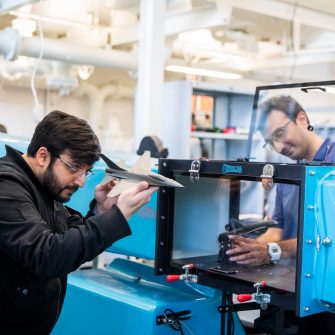Bachelor of Engineering (Honours) (Robotics and Mechatronics)
- Commencing Terms
- Term 1, 2 & 3
- Duration
- 4 Year(s)
- Delivery Mode
- Face-to-face (includes blended)
- Campus
-
Kensington
- Codes
- UAC code 425020
- Program code 3707
-
2025 Indicative first year full fee
- $8,000*
-
2025 Indicative full fee to complete degree
- $36,500*
-
2025 Indicative first year full fee
- $58,500*
-
2025 Indicative full fee to complete degree
- $253,500*

- Overview
- Entry requirements
- What will I study?
- Future careers
- Double degrees
- How to apply
- Fees & Scholarships
Overview
This degree intertwines mechanical engineering, control engineering and software development, specifically for controlling sophisticated smart machines and robotics.
Mechatronic engineers work across all aspects of smart machines – from design and testing through to manufacture in industries such as robotics, medical and assistive technology, human-machine interaction, manufacturing, unmanned aerial and ground vehicles and education.
Through your study at UNSW Engineering, you’ll develop hybrid skills in mechanics, electronics and computing. Our students come to understand the conception, design, construction, maintenance, integration and repair of smart machines. These machines include robots, white goods, cameras, automated test equipment and transport vehicles.
This bachelor’s degree will build your knowledge in areas including building services, computer-controlled plant, manufacturing, robotics and autonomous vehicles. We emphasize the application of engineering science, development and management in these fields. We’ll balance the theory and knowledge development with your hands-on application of skills learned in your degree. To get you work-ready, you'll apply these skills through 60 days of approved industrial training.
Key features
UNSW Bachelor of Engineering (Honours) (Robotics and Mechatronics) is a four-year full-time degree in the newest area of engineering, robotics and mechatronics.
The Bachelor of Engineering (Honours) degree is globally recognised and is accredited by Engineers Australia and acknowledged by the Washington Accord. Part of the degree involves applying your skills through 60 days of approved industrial training in Australia or overseas. Your industrial training will give you a taste of a real-world professional engineering setting and the hands-on experience to become career-ready.
Flexibility and choice are ingrained in the degree structure through the range of elective courses on offer. You’ll have the chance to take part in Humanitarian Engineering projects, where you work to deliver solutions to improve quality of life for disadvantaged individuals and communities. These solutions may provide essential services such as food, water, shelter, energy and information where they are unavailable.
You can complete a Flexible First Year when you study this degree. Flexible First Year allows you to explore different engineering fields before choosing your specialisation. The first year of engineering study has a core of common subjects, plus a wide choice of electives, so you can figure out which one is right for you.
Why study this degree at UNSW?
We’re the largest Mechanical Engineering school in Australia with more than 2500 undergraduate and postgraduate students and 90 staff members. Our staff and students make significant impacts in the field of Mechatronics in Australia and around the world with numerous awards and recognitions.
We're ranked #1 in Australia and #25 globally for Engineering and Technology. As well as this, all of UNSW's Engineering schools are ranked in the global top 50 with two schools ranked in the global top 10 for Engineering subjects (QS World University Rankings by Subject, 2025).
We're known as the leading Mechanical Engineering school ranked #1 in Australia for Mechanical, Aeronautical and Manufacturing Engineering (QS World University Rankings by Subject, 2025).
With state-of-the-art facilities, world-class researchers and some of the country's brightest engineering students, we’re the best place to turn your interest in Mechatronics into a successful professional career.
- We place strong importance on the translation of research into practice
- Due to recent investment, we are now home to many cutting-edge laboratory facilities which are unique nationally
- You’ll with state-of-the-art technology, we apply complex theories to the development of next-generation robotic systems and autonomous vehicles
- Students receive first-hand practical experience by participating in exciting and innovative student-led projects and industry-based training
- Strong partnerships with industry in education, research, training and employment
- A flexible first-year program consisting of a wide choice of electives and five core courses in Maths, Physics, Engineering, Design and Computing
UNSW is known for its graduate employability, with UNSW awarded the Most Employable students for six years in a row (Australian Financial Review (AFR) Top100 Future Leaders Awards, 2020-2025).
This degree includes 60 days Industrial Training which provides a Work Integrated Learning (WIL) experience. WIL allows you to engage in work learning experiences that integrate academic learning with its application in the workplace, connecting you directly with industry and community partners.
Take part in interactive learning through the ChallEng program. The ChallENG program connects students, academics and companies to exciting, real-world projects and learning-based initiatives. The program will prepare you for your future career by helping develop technical and design skills and expanding your professional expertise.
At UNSW Engineering you’ll benefit from a diverse and welcoming community with plenty to keep you busy. UNSW Engineering boasts 16 student societies including a society for each school. Get involved in Queer Students in Stem, Women in Renewable Energy Society or Robogals. UNSW’s Women in Engineering (WIE) society runs social and industry events as well as programs designed to mentor and develop female engineers.
Want to see more from UNSW Engineering?
Entry requirements
Assumed knowledge
Mathematics Extension 1, Physics.
Adjustment Factors
We offer a range of adjustment factor schemes that reward students for academic performance and extra-curricular achievements. These schemes also take into account a range of personal and educational disadvantages that may have affected your studies.
HSC Plus
This scheme rewards students who perform well in Year 12 subjects that are relevant to their preferred UNSW degree. You may be awarded up to five points.
Elite Athletes, Performers and Leaders (EAPL)
This program recognises achievements in the areas of sport, academia, leadership and music at an elite level. You may be eligible for up to five points.
Educational Access Scheme (EAS), opens in a new window
Factors such as illness, financial hardship, language difficulties or attending a particular school can mean you don't always get the best possible marks in Years 11 and 12. If one of these situations applies to you, submit an application for the Educational Access Scheme (EAS) via UAC. Eligible students can receive between 1 and 10 points towards their chosen UNSW degree.
Admission pathways
This degree is eligible for admission through our Portfolio Entry Early Conditional Offer Scheme. Complete a submission to demonstrate your passion and performance in relevant subjects. Successful applicants will receive an early conditional offer with an adjusted ATAR entry requirement.
English language requirements
You may be asked to provide evidence of your English proficiency to study at UNSW depending on your educational background and citizenship. English language skills are vitally important for coping with lectures, tutorials, assignments and examinations - this is why UNSW requires a minimum English language competency for enrolment.
If you’re completing an Australian Year 12 qualification (e.g. NSW HSC or equivalent), you do not need to provide anything extra to prove your proficiency. Your qualification will be used as evidence of your English proficiency.
If you do need to provide evidence of your English proficiency, this will be indicated in your application. You can prove this by providing evidence that you meet one or more of the following criteria:
- English language tests and university English courses
- Prior study in the medium of English
- Other qualifications
If you need to improve your English skills before you start your degree, UNSW College’s Academic English Programs are for you. The programs are suitable for various English levels and help you prepare for university studies and life in Australia.
For more details, visit the English Language Requirements page.
International direct entry
| Qualifications | Direct entry requirement |
|---|---|
|
International ATAR
|
85.0
|
| UNSW Foundation Studies GPA |
7.5
|
|
Great Britain General Certificate of Education (GCE A levels)
|
11.0
|
|
International Baccalaureate Diploma (IB)
|
32.0
|
|
Scholastic Aptitude Test (SAT) (after 2016)
|
1210.0
|
We do not accept secondary qualifications from this country. We may accept tertiary study results, please contact us for more information.
Please contact us for direct entry requirements.
Admission pathways
If you do not meet the requirements for direct entry into your chosen degree, you may be eligible for a pathway program with UNSW College. UNSW College provides alternative entry options using university-approved content so that you can start your UNSW journey with confidence.
English language requirements
You may be asked to provide evidence of your English proficiency to study at UNSW depending on whether you are from an English-speaking background or non-English speaking background. English language skills are vitally important for coping with lectures, tutorials, assignments and examinations - this is why UNSW requires a minimum English language competency for enrolment.
If English is not your first language, you’ll need to provide proof of your English proficiency before you can be given an offer to study at UNSW. You can do this by providing evidence that you meet one or more of the following criteria:
- English language tests and university English courses
- Prior study in the medium of English
- Other qualifications
If you need to improve your English skills before you start your degree, UNSW College’s Academic English Programs are for you. The programs are suitable for various English levels and help you prepare for university studies and life in Australia.
For more details, visit the English Language Requirements page.
Check the specific English language requirements for this program
Program structure
We provide you with a solid background in mathematics, natural sciences and computing that will prepare you for learning knowledge and skills in an engineering discipline specialisation.
You’ll get the chance to apply yourself to engineering design and enquiry projects, professional engineering practice, engineering and technical management and conduct research towards your thesis project.
Minor in Nuclear Engineering
In this degree, you can choose to study a minor in Nuclear Engineering. With a UNSW Minor in Nuclear Engineering, you will be able to apply your degree expertise to work on energy efficiency, material improvements, defence technology, and crucial nuclear medicine for Australia. Find out more.
Full program structure
Degree structures can vary depending on your specialisation of choice, the number of courses you choose and timetabling, to give you an indication you can consider the below.
In your first year you might study:
Two introductory courses in Mathematics
An introductory course in Physics,
and an introductory course in Computing
You may also study an introductory course related to your specialisation of choice. These courses equip you with the skills required for the rest of your Engineering degree.
All students study ENGG1000 “Introduction to Engineering Design and Innovation”. In this course you’ll learn to think the way that engineers think, developing solutions with limited budget, time and resources.
In your second year you’ll undertake:
Courses from your selected specialisation
Core courses to give you the fundamental knowledge in your area of interest
In your third and fourth year you’ll develop your knowledge further with a range of core and elective courses.
During your degree you’ll be required to complete two General Education electives. These courses help you broaden your education by completing two courses from outside the engineering faculty strengthening your cross-disciplinary thinking, developing a flexible approach and enhancing your critical analysis skills.
This degree also requires you to complete 60 days of industrial training, which gives you some on the job experience before graduating. This multidisciplinary educational approach connects students, academics and industry enabling you to develop the essential technical and professional skills, so you thrive in your future career.
Future careers
The demand for engineers with experience and knowledge of computing, robotics and engineering principles continues to grow as industries evolve.
You’ll find mechatronic engineers in large global enterprises developing futuristic vehicles, challenging defence technology and revolutionising consumer products. They also work in smaller innovative ‘high tech’ companies supplying software, parts and equipment or as product developers, work in manufacturing.
As a mechatronic engineer, you can work in many industries where automation is in demand, such as manufacturing, automotive, mining, cargo handling and agriculture. Our graduates have the expertise to work in companies that design and manufacture consumer devices such as mobile phones, specialised industrial equipment, video game consoles and biomedical devices such as Cochlear implants.
Graduates can pursue careers in industries and sectors including:
- Automation
- Robotics
- Computer simulations and modelling
- Gaming
- Engineering design
- Propulsion systems
- Control systems
- Technology
Accreditation
This degree is globally recognised and is accredited by Engineers Australia and acknowledged by the Washington Accord.
Part of this degree involves applying your skills through 60 days of approved industrial training in Australia or overseas. Your industrial training will give you a taste of a real-world professional engineering setting and the hands-on experience to become career-ready.
Double degrees
Combine your talents and passions to open future opportunities suited to your unique strengths. Despite the name, double degrees are not double the workload! You'll study core courses in two areas of expertise, graduating with two qualifications in less time than it takes to complete two consecutive degrees.
Double your knowledge, skills, and career options with the Bachelor of Engineering (Honours) and:
- Advanced Mathematics (Honours)
- Advanced Science (Honours)
- Arts
- Commerce
- Computer Science
- Engineering Science
- Fine Arts
- Law
- Science
- Master of Biomedical Engineering*
*Double Degree only available with some Bachelor of Engineering (Honours) specialisations.
How to apply
Applications for undergraduate study from domestic students (Australian citizens, Australian permanent residents, Australian permanent humanitarian visa holders and New Zealand citizens) are processed by the Universities Admissions Centre (UAC).
Visit the Apply section of the UAC website, opens in a new window and you can nominate up to five degrees in order of preference, with the first being your most desired degree and university.
On-time applications for admission usually close at the end of September each year for Term 1 admission. Late applications can be submitted, but a late fee will apply. For study starting in Term 1, the majority of offers are made in December and January. Visit the UAC website, opens in a new window for key dates for admission outside of Term 1.
Ready to start your application?
For most international students, applications are submitted via our Apply Online service. We encourage you to submit your completed application as early as possible to ensure it will be processed in time for your preferred term.
Some high-demand programs with limited places, may have an earlier application deadline or may have an earlier commencement date. For more information visit our international applicant information page.
*If you are an international student studying an Australian qualification, go to the Universities Admission Centre (UAC), opens in a new window for application and UAC key dates. Note: If you are under 18 years of age, you need to make special arrangements. Read more.
Ready to start your application?
Fees & Scholarships
Commonwealth Supported Place: Student Contribution Band 2
*The student contribution for a Commonwealth Supported Place is an indication only of the amount payable in Year 1 based on a standard full-time load of 48 credit points (1.0 EFTSL). The actual student contribution you will be liable for depends on your individual program of study and the calendar year in which you enrol. Actual fees are calculated upon enrolment. Student contribution amounts are subject to annual review by the university and may increase each year during your studies (subject to caps determined by the Australian Government), effective at the start of each calendar year.
The indicative fees listed here are based on an estimated average and are for tuition only - other fees and charges are not included.
*Fees are subject to annual review by the University and may increase annually, with the new fees effective from the start of each calendar year. The indicative fees listed here are based on an estimated average and are for tuition only, other fees and charges are not included. The amount you pay will vary depending on the calendar year to enrol, the courses you select and whether your study load is more or less than 1 Equivalent Full Time Student Load (8 courses per year).
Indicative fees are a guide for comparison only based on current conditions and available data. You should not rely on indicative fees. More information on fees can be found at the UNSW fees website.
Indicative fees to complete the program have been calculated based on a percentage increase for every year of the program. Fee increases are assessed annually and may exceed the indicative figures listed here.
Indicative fees to complete the program include tuition plus an estimate of study-related costs of approximately $1,000 per year. To find out more about other costs, visit UNSW International.
Scholarships
At UNSW, we award over $83 million in scholarships each year. We pride ourselves on rewarding excellence and making university accessible to students from all walks of life. Whether you’re a domestic or international student, our range of scholarships, prizes and awards can support your journey.
Featured scholarships
Women in Engineering Scholarships
UNSW provides a wide range of Women in Engineering scholarships to support high-achieving female students throughout their degree.
Apply here and search for ‘Engineering’ in the keywords.
Engineering Rural Scholarship
The Faculty of Engineering Rural Scholarships Program aims to assist high achieving high school students from rural or isolated areas to study in the Faculty of Engineering at UNSW.
Apply here and search for ‘Engineering’ in the keywords.

QS World University Rankings, 2025

AFR Top100 Future Leaders Awards, 2020-2025

#1 Australian uni attended by start-up founders





